Photographs: Danish Ismail/Reuters
Being the wife of separatist turned mainstream Kashmir leader Sajad Lone and the daughter of one of the JKLF founder members Amanullah Khan, Asma Khan Lone, 34, has seen the Kashmir developments as an insider.
She feels that the freedom movement has lost its original vision and conviction. In an interview she tells Bula Devi that the movement now is only serving vested interests instead of reflecting the sentiments of the Kashmiris.
Asma who is a columnist and a serious commentator on Kashmir, worked as a Research Associate with the Institute of Strategic Studies, Islamabad, and her area of study was Kashmir. She is now working on a monograph that deals with Pakistan post 9/11.
What do you think of the present phase in Kashmir which is on the boil again?
I think it's very unfortunate that once again there is such ruthless loss of human life and that too mostly unarmed teenagers or bystanders.
I think each political player has vested interest in keeping Kashmir on the boil where this allows for states to pursue their respective 'national interests', it enables various individuals (across the board) to promote their respective careers and political statures with of course the cruel brunt falling on the hapless common Kashmiri.
...
'Kashmiri society has been gravely scarred'
Image: Army soldiers stand behind seized a display of under barrel grenade launchers (UBGL) during a news conference in a garrison in SrinagarPhotographs: Danish Ismail/Reuters
How do you see the future of Kashmir?
Conflict has unfortunately taken a very heavy toll on our society in all its manifestations. It will take a lot of time and effort for the wounds to heal, if at all.
Not just politically but even socially we have undergone a change for the worst brewing a vulnerable identity crisis and loss of national self-assuredness.
Even if politically we are able to reach some solution, I don't think Kashmir will ever be able to reclaim its rich syncretic identity weaving into unison assorted traditions and thought processes, which brought out the best that society had to offer and enabled it to acquire the grandeur it historically did in terms of culture and higher intellectual stimulation.
I think Kashmiri society has been gravely scarred.
There has developed an ingrained fear psychosis where we have unfortunately lost our belief and hope in the kindness of humanity and virtues of nature. From a sociological point of view this is very damaging and dangerous.
Politically, things are very discouraging and disillusioning as well. The freedom movement has grossly derailed from its pioneering vision and convictions.
'Interests seem to have been long blurred'
Image: Kashmiri protesters shout pro-freedom slogans during an anti-India protest in SrinagarPhotographs: Danish Ismail/Reuters
Today in the fiercely contested and layered interests of various political players the actual cause of the movement reflective of Kashmiri sentiment and interests seem to have been long blurred.
I, in fact, think we as Kashmiris in each of our individual capacities have collectively failed ourselves much to the detriment of our cause and substantive role in finding a meaningful and dignified solution to the Kashmir imbroglio.
Are women in Kashmir getting radicalised? If so, what should be done to stop it?
I think it's a worldwide phenomenon where we are seeing a re-assertion of religion whether it is the born-again Christians, the extremist Muslims or the growing reach of Hindutva; religiosity has come to capture peoples' imagination.
In Kashmir too there is an extension of this phenomenon but I think it has other undercurrents, too.
'Radicalisation of religion is a concern'
Image: A Kashmiri protester throws a stone towards Indian police during an anti-India protest in SrinagarPhotographs: Danish Ismail/Reuters
Personally, I am a practicing Muslim and earnestly believe in having some form of spiritual anchorage. Yet I think radicalisation of religion through misinterpretation can be a cause for grave concern.
This is a concern the roots of which people in New Delhi need to seriously address.
What is it that you would like Kashmir to be like?
Kashmir is a piece of paradise in this part of the universe and should thus epitomise the beauty bestowed upon it by manifesting as a harmonising factor between both India and Pakistan rather than symbolising the present discord -- somewhat on the lines of Switzerland in the heart of Europe.
'Institutionalise free movement across LoC'
Image: A policeman stands guard in front a closed shop marked with graffiti during a curfewPhotographs: Fayaz Kabli/Reuters
On a more political framework I would have wanted a reunification of the entire state as it stood in 1947 coalescing as a single independent entity.
However, keeping in mind the present geo-political realities I think we should start with institutionalising free movement across the Line of Control wherein people, goods and state institutions be free to interact and mingle with each other.
This would remove a major psychological barrier -- already the limited trade that has been initiated between both parts of the erstwhile state has generated ample employment and opportunities for greater private enterprise. This should be an essential first step towards determining the larger right to self-determination of the Kashmiri people.
I would also want the Kashmiri Pandits to return as they have an equal right over their motherland. The society that should hence be rebuilt should be a harmonious and egalitarian one, imbued by the principles of equal rights and opportunity irrespective of cast, creed or faith.
'Pak would always want to retain an element of influence on Kashmir'
Image: Policemen stand guard before a search operationPhotographs: Fayaz Kabli/Reuters
There was a paradigm shift during the (Pervez) Musharraf era.
Changing ground and regional realities also brought about a shift.
As far as the common masses are concerned, as long as Pakistan's perceived insecurities are addressed, such as the water issue, any solution that is representative of the larger Kashmiri aspiration but with a disposition that is friendly towards Pakistan, will be acceptable to the Pakistani people.
As far as the state of Pakistan is concerned, it would always want to retain an element of influence on Kashmir on the lines of 'strategic depth' in Afghanistan.
It would also want to safeguard and promote aspects of its national interest such as adequate flow of water, market for trade, renewal of the ancient silk route and other aspects of national security.
'Independent Kashmir does not seem an immediate probability'
Image: A boy shouts pro-freedom slogan during an anti-India protest in SrinagarPhotographs: Danish Ismail/Reuters
As of now, and given the prevalent geopolitical dynamics, an independent Kashmir that is symbolic of the larger sentiment, does not seem an immediate probability.
The political situation will have to progress through phases of 'earned sovereignty' or phased sovereignty accommodating the interests of both India and Pakistan before moving towards a final resolution.
Your father once said you are a politically minded person; do you have any intentions of joining politics?
Growing up amidst heavy doses of politics it's but natural that I be political minded and then living in a conflict zone like Kashmir it further makes one politicised and opinionated.
However, personally I don't think I have the temperament for active politics.
I want to make my contribution through my pen and social work and try to prolong my father's legacy in that way.

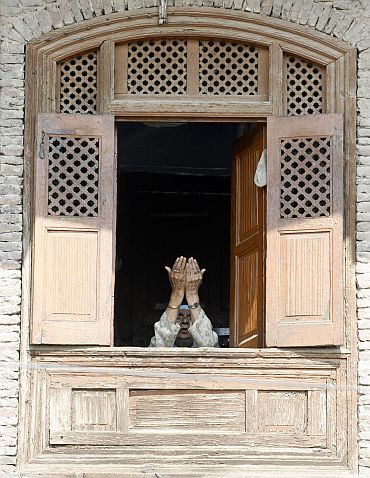
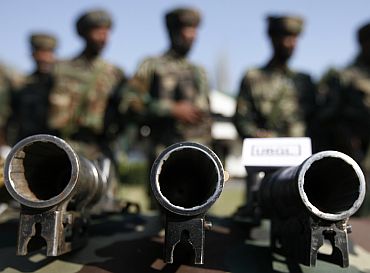
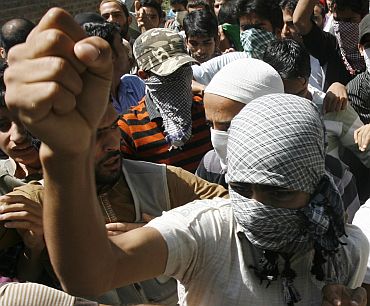
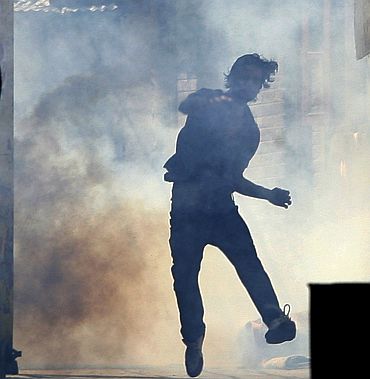
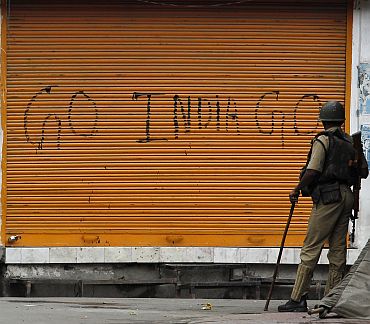
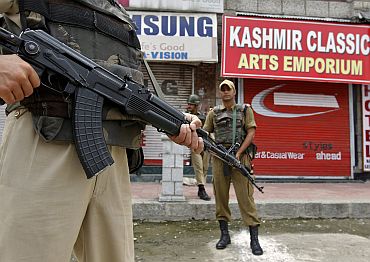

article